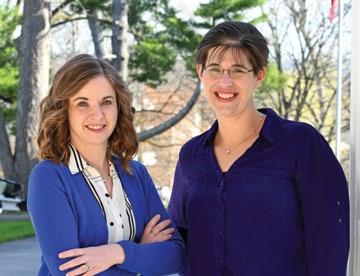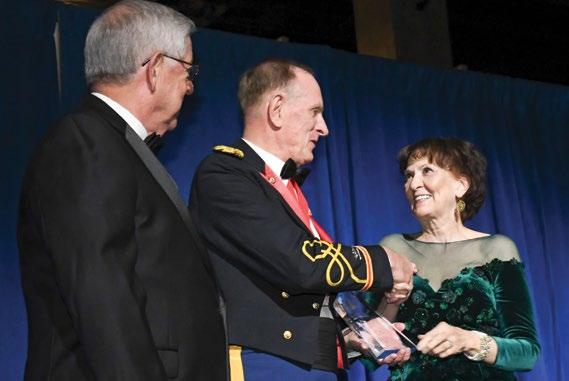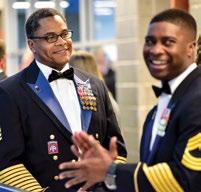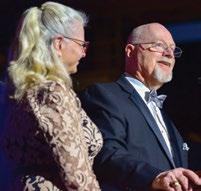
16 minute read
Nationally competitive scholarships open doors of opportunity
Nationally competitive scholarships open doors of opportunity By J.K. Devine Photos by Peggy Cozart
Four UNG students will travel to Thailand, Kyrgyz Republic, Indonesia, and Russia to spend 10 months as English Teaching Assistants. Six will head to Spain, Taiwan, Japan, and Jordan this summer to participate in credit-bearing study abroad programs. Four will trek to China and Japan, respectively, for a cultural immersion program. And two more will study a critical language for up to a year in Oman and Kazakhstan in exchange for working with the U.S. government for a year upon their return.
Advertisement
They are UNG’s Fulbright finalists, Early Summer Gilman scholarship recipients, Critical Language Scholarship (CLS) finalists, and Boren award winners. These are just a handful of highly competitive scholarships UNG students have won in spring 2019. In fact, UNG collected two new awards this year: John Blessing was the school’s first Truman Scholar while Brendyn Melugin became UNG’s first American Council on Education (ACE) Student of the Year.
Each student plans to use their overseas experience and scholarship to help further their future professions in education, languages, law, and military and government service.
For example, Petrus Schoeman plans to use his time in Russia as a way to achieve his dream.
“My ultimate goal is to make language learning apps,” the 2018 UNG graduate said.
So far, he is fluent in Chinese thanks to a yearlong study abroad in the Asian country. Now, the 27-year-old, who was born in South Africa and lives in Dahlonega, Georgia, wants to be fluent in Russian.
Schoeman will have that chance as one of four UNG finalists selected for the Fulbright U.S. Student Program. He will spend the 2019-20 academic year teaching English to Russian students.
The other UNG finalists selected for the prestigious award are: • Marcel Cantu who will teach in Thailand. The
Newnan, Georgia, native graduated in May 2019 with a degree in English education. • Melissa Silva who will teach in Kyrgyz Republic. The
Gainesville, Georgia, native will graduate in August 2019 with a degree in Spanish. • Caitlyn Webb who will teach in Indonesia. The
Suwanee, Georgia, native graduated in May 2019 with a degree in history education with a minor in Spanish.
Two UNG students were named alternates. If a finalist withdraws, the alternate may become a finalist. The two are: • Jenna Labbie who hopes to teach in Taiwan. The
Locust Grove, Georgia, native graduated in May 2019 with a degree in history and secondary education. • Emily Symmes who hopes to teach in Republic of
Kazakhstan. The Cumming, Georgia, native graduated in May 2019 with a degree in Russian.
Fulbright finalists and countries from 2015-19
2018-19 Katie Smith, South Korea | Amanda Hamilton, South Korea | Lily O’Clery, Taiwan 2017-18 Nicholas Allen, Senegal | Faith Brown, Bulgaria | Rachael Bryant, South Korea | Mitchell Fariss, Germany Darion Gibson, South Korea | Katie McCullough, Poland | Noah McDaniel, India | Anita Renfroe, Malaysia 2016-17 Cody Bijeaux, Taiwan 2015-16 Jacob Dietrich, Oman | Erika Evans, Russia
Marcel Cantu Fulbright Finalist Petrus Schoeman Fulbright Finalist
Melissa Silva Fulbright Finalist

Caitlyn Webb Fulbright Finalist
“Our faculty and staff have done an amazing job of mentoring our already talented students to compete successfully for some of the nation’s most prestigious scholarship opportunities and help them fulfill their potential.” — UNG President
Bonita Jacobs
Jenna Labbie Fulbright Alternate
Emily Symmes Fulbright Alternate
Fulbright finalists spend 10 months in their respective countries as English Teaching Assistants. Schoeman, who earned a degree in computer science, said the constant interaction with Russian students will help him two-fold.
“I can get teaching experience, which is important to make language learning apps,” he said. “And I want to find out from Russian students the kind of software and apps they want to use to learn another language. For me to have this opportunity of language education is huge.”
The Fulbright program is a highly competitive fellowship that enables graduates to pursue academic endeavors overseas. It is designed to increase mutual understanding between U.S. citizens and residents of more than 160 foreign countries.
“UNG’s mission is focused on developing globally prepared leaders,” UNG President Bonita Jacobs said. “Our faculty and staff have done an amazing job of mentoring our talented students to compete successfully for some of the nation’s most prestigious scholarships and help them fulfill their potential.”
UNG’s odds of securing finalists have increased in recent years as more students apply.
“As UNG increasingly focuses on global engagement, we are also seeing an increase in the number of students interested in the Fulbright,” said Dr. Anastasia Lin, assistant vice president of research and engagement. “For all of these scholarships, the first few wins really set the stage for more involvement, more applications and potentially more scholarships.”
This year, 20 students applied for the Fulbright; 13 were named semifinalists, which marked a new record for UNG.
Becoming a semifinalist is no easy task. The process is filled with workshops to choose a location, develop essays and identify goals; campus interviews and meetings with faculty mentors to fine-tune proposals; and one-on-one attention on essays from Lin and Dr. Victoria Hightower, assistant director of the Nationally Competitive Scholarship (NCS) Office at UNG.
However, the first step is the same. It begins with a student.
For Cantu, her inspiration to teach abroad began with a mission trip to Kenya before high school. In the east African country, she taught children the colors, shapes and basic English words.
“I feel in love with teaching and traveling,” the 20-year-old from Newnan, Georgia, said. “The Fulbright is the natural fit for that.”
Silva decided to apply for the Fulbright after Dr. Alexander Wisnoski, assistant professor of history, encouraging her and others to conduct undergraduate research or study abroad.
“He said we need to do something that makes us standout from the rest,” the 21-year-old from Gainesville, Georgia, said. “It hit me that I needed to try.”
During her application process for the Fulbright, Lin suggested she

Dr. Anastasia Lin, left, and Dr. Victoria Hightower help guide students through the application process for nationally competitive scholarships.
apply for the Benjamin A. Gilman International Scholarship. The Gilman is awarded to U.S. citizen undergraduate students who receive Federal Pell Grant funding at two-year or four-year colleges or universities to participate in study and intern abroad programs. It is geared toward supporting students who are underrepresented in study abroad programs.
As a first-generation student with parents from Mexico, Silva fits the bill. She said she applied to study in Spain for the summer “to find links to my Mexican culture since Spain colonized Mexico.” She will have that chance as one of six students awarded a 2019 Early Summer Gilman.
With one scholarship in her belt, Silva felt confident about her Fulbright application. Turns out she was right.
“I feel like I am about to live a lavish lifestyle,” Silva said. “I am so excited to see the world. And I look forward to getting to my own classroom to teach students and learn Russian from my students.”
Silva is one of six students who earned Early Summer Gilman Scholarships. The other five are:
Gabriella “Gabi” Fleck, majoring in Spanish, will study in Spain.
Elias Keif, majoring in strategic and security studies with a concentration in cybersecurity and East Asian studies with a concentration in Chinese and in the ROTC Chinese Flagship, will study in Taiwan.
Alexa Hernandez-Lopez, majoring in visual arts, will study in Japan.
Gabe Holder, majoring in Spanish and minoring in Arabic, will study in Jordan.
Naomy Huaman, majoring in international affairs, will study in Japan.
The four Critical Language Scholars finalists are:
Daniel Shearer, who is pursuing a degree in East Asian studies with a concentration in Japanese studies and a minor in leadership, will be in Japan.
Josh Shepherd, who is pursuing a degree in Chinese and a minor in Spanish, will be in China.
Donnie “Jamar” Shumaker, who is pursuing a degree in East Asian studies with a concentration in Chinese and a minor in Chinese language and culture, will be in China.

Rachel Wilson, who is pursuing a degree in finance and a minor in Chinese, will be in China.
The CLS program is a fully-funded overseas language and cultural immersion program for American undergraduate and graduate students. Its goal is to broaden the base of Americans studying and mastering critical languages and building relationships between the people of the United States and other countries.
It is highly competitive, with acceptance rates of 10%, Hightower said. This makes UNG’s accomplishment of four finalists significant.
“UNG’s four finalists and four alternates reflect our commitment to cultivating academically talented global leaders,” Lin said. “This also indicates UNG’s prowess in teaching critical languages.”
UNG’s two David L. Boren Scholarships winners are:
Laine Hunt, who is pursuing a degree in international affairs with a Middle East track, will study Arabic in Oman. Her goal is to work in the intelligence community.
Cadet Alexander Ross, who is pursuing a degree in Russian and a member of the Corps of Cadets and in the Georgia National Guard, will study Russian in Kazakhstan. His goal is to become a linguist with the National Security Agency. Ross is UNG’s second Boren to Oman and first to Kazakhstan.
Funded by the U.S. Department of Defense’s National Security Education Program, Boren Scholarships are worth up to $20,000 for a recipient to spend up to a full academic year studying abroad. They receive the scholarship in exchange for their commitment to seek work in the federal government for at least one year after graduation.
Two new firsts for UNG were the ACE Student of the Year and the Truman Scholar.
Brendyn Melugin was named the national ACE Student of the Year, which is presented annually to an adult learner who has benefited from the use of ACE credit recommendations to earn a college degree or advance a career.
John Blessing was selected as a Harry S. Truman Scholarship Foundation recipient, a nationally competitive award that provides up to $30,000 for undergraduate students to attend graduate school in preparation for careers in government or public service.
UNG students have received the following awards in the past six years
41 Benjamin A. Gilman International 9 Critical Language Scholarships. 3 National Institutes of Health
15
Scholarships. Fulbright Scholarships with nine awarded in 2017. 6 Chinese Government
Scholarships | Newman Civic Fellowships | Chinese Undergraduate Scholarship Program | Huayu Enrichment Scholarships. 14 David L. Boren Scholarships. Government Scholarships | Woodrow Wilson Science, 2 Jack Kent Cooke Undergraduate
Transfer Scholarships | Harry S. 10 Freeman-Asia Scholarships. Technology, Engineering, and Math Teaching Fellowships. Truman Scholarship Foundation finalists.
Annual Scholarship Gala Scholarship Gala celebrates record $1.8 million in student scholarships



Annual Scholarship Gala
By Clark Leonard Photos by Peggy Cozart and Estefani Orea ’20
Clockwise from top left: Retired Army Col. James T. Palmer, a 1973 alumnus who will retire as UNG’s Commandant of Cadets at the end of June, received the Summit Award. | Cadet Col. Tyler Farney, commander of UNG’s Boar’s Head Brigade, was one of the student speakers. | Attendees pause for a photo before entering the gala. | Dr. Bonita Jacobs and UNG Foundation Board Chair Jimmy Faulkner celebrated the record $1.8 million in scholarship funds awarded to UNG students. | Dr. Randy and Peggy Kirner, a 1967 alumnus and his wife who established the Randall and Peggy Kirner Scholarship in July 2017, received the Champion Award. | Military officials and cadets donned their dress uniforms for the special evening. | Former dean Mike Hyams and his wife Diana posed for photos as they arrive.


The seventh annual UNG Scholarship Gala held March 29 celebrated a record $1.8 million in scholarship funds awarded to students who entered or attended UNG in fiscal year 2018.
Increasing scholarship funds has been one of President Bonita Jacobs’ top presidential priorities, and the first scholarship gala was held in 2013 as part of her inauguration.
The total dollars raised from the eve ning equaled $186,850. An 8.7% increase over 2018 and a 59% increase over 2017.
In addition to thanking donors for their generosity, the black-tie optional event at the university’s Convocation Center included dinner, entertainment and the presentation of the Summit, Champion and Presidential Leadership awards.
Retired Army Col. James T. Palmer, a 1973 alumnus who will retire as UNG’s Commandant of Cadets at the end of June, received the Summit Award. It recognizes an individual, family or organization for significant contributions to scholarships at UNG over an extended period, particularly when those contributions serve to change the expectation for scholarship giving at UNG. Palmer has been instrumental in the growth of fundraising mechanisms for the Corps of Cadets. His 20-year tenure with the Corps followed a 26-year active-duty career.
Georgia House of Representatives Speaker David Ralston, a UNG alumnus, earned the Presidential Leadership Award. The award recognizes an individual who has made a signifi cant, positive impact on the life and advancement of the university. A Blue Ridge, Georgia, resident, Ralston led the effort that secured state funds for UNG’s standalone Blue Ridge Campus, which is scheduled to open in fall 2020.
Dr. Randy and Peggy Kirner, a 1967 alum nus and his wife who established the Randall and Peggy Kirner Scholarship in July 2017, received the Champion Award. It recognizes an individual or organization for significant contributions within the past two years that promote scholarship and giving to UNG.
Illustration by Josie Toney
Helping firstgeneration students succeed at
UNG and beyond
By J.K. Devine Photos by Peggy Cozart

Armando Tercero-Escobar never planned to go to college. He intended to get a job after graduating from Gilmer High School.
The Ellijay, Georgia, native also didn’t want to leave home, since his mother was diagnosed with cancer. Plus, his grades started to slip. That is, until members of the Upward Bound Program got Tercero-Escobar back on track.
“They were there for me and made sure that I graduated,” the UNG freshman said. “They helped me with my college applications and scholar ships and made sure I had everything I needed. I decided to go to college to make my mother proud and make sure her sacrifices for me weren’t for nothing.”
Helping first-generation students like Tercero-Escobar prepare for and be successful in college is the purpose of Upward Bound. Funded through a $2.6 million grant from the U.S. Department of Education, the program provides tutoring sessions, ACT/SAT and college preparation sessions, career exploration, cultural experiences, and college visits during the academic year. In the summer, students live in the residence halls and attend classes at UNG’s Dahlonega Campus to get the full college experience.
The program is limited to 120 students: 60 from Gilmer High School in Ellijay, Georgia, and 60 from Johnson High School in Gainesville, Georgia. After the first full year in operation, Dr. N. Latrice Richardson, program director of Upward Bound at UNG, said the results are measurable.
Of the 10 Gilmer High students who graduated in spring 2018, eight attend UNG’s Blue Ridge Campus while the other two enrolled at Dalton State. Only freshmen, sophomores and juniors at Johnson High School were enrolled in the Upward Bound Program in fall 2017, so the program will have its first graduating cohort this spring, with several accepted into Georgia colleges.
“I’m encouraged by the successes of our first year and the achievements both programs have experienced in year two of the grant. We are strengthening
partnerships in the community and building our capacity to serve students on the UNG campuses in a meaningful way,” Richardson said. “All of the 2018 Upward Bound graduates from Gilmer High are still enrolled in college in the 2019 spring semester.”
UNG freshman Kameron Stone is one of eight graduates at the Blue Ridge Campus. She attributes her success of being a college student to Anna Speessen, the Upward Bound counselor at Gilmer High.
“She was there to answer any questions regarding FAFSA and how everything works,” Stone said. “She put college terms into a way I could understand.”
Her sister, Halee, agreed. Kameron and Halee are two of a set of quintuplets.
“The stress of the process of applying for college in its entirety was definitely lessened, as we were wonderfully guided with knowledgeable advice that made things much more easily under standable and simple,” Halee said.
Upward Bound is not the only UNG program focused on assistance for first-generation students. In 2017, the university was awarded $1.13 million over five years for the Ronald E. McNair Post-Baccalaureate Achievement Program. Its purpose is to con tinually serve 25 high-achieving, low-income, first-generation and/ or underrepresented students who want to enroll in graduate school.
The McNair Scholars Program identifies and prepares UNG sophomores, juniors and seniors for post-baccalaureate studies through involvement in research and other scholarly activities. Each is matched with a faculty member
The stress of the process of applying for college in its entirety was definitely lessened. — Halee Stone Upward Bound graduate
— Thomas Hayes McNair Scholar
to conduct scholarly research and establish a formalized mentorship, said Iris Royal, program director of the McNair Scholars at UNG.
So far, the program — just like Upward Bound — can tout quantifiable success. A handful of UNG seniors were accepted into graduate-level programs.
Based on these results, Iris Royal said UNG will exceed its milestones. The program’s success is evident in the changes to students, which is the goal.
“When I see a student comes from doubt that they can go to graduate school, and then see them in our office every week filling out applications, or when I see a student who thought they weren’t good enough to go to graduate school, and now they are talking about schools everywhere … it warms my heart to see that,” said Royal, herself a McNair Scholar graduate.
Currently, 25 students are in the McNair Scholars program. While they strive to achieve their graduate school goals, they also give back to Upward Bound.
Thomas Hayes, a McNair Scholar and junior pursuing a degree in computer information systems, was one of the counselors for Upward Bound’s summer program. The 27-year-old from Suwanee, Georgia, said his focus was to keep things in perspective for the high school students.
“I tried to keep them looking at the whole experience and let them know it’s a step-by-step process,” Hayes said. “It’s not one big step to college. There are multiple steps. If you look at each individual step, you won’t get overwhelmed with the path of attending college and graduating.”


